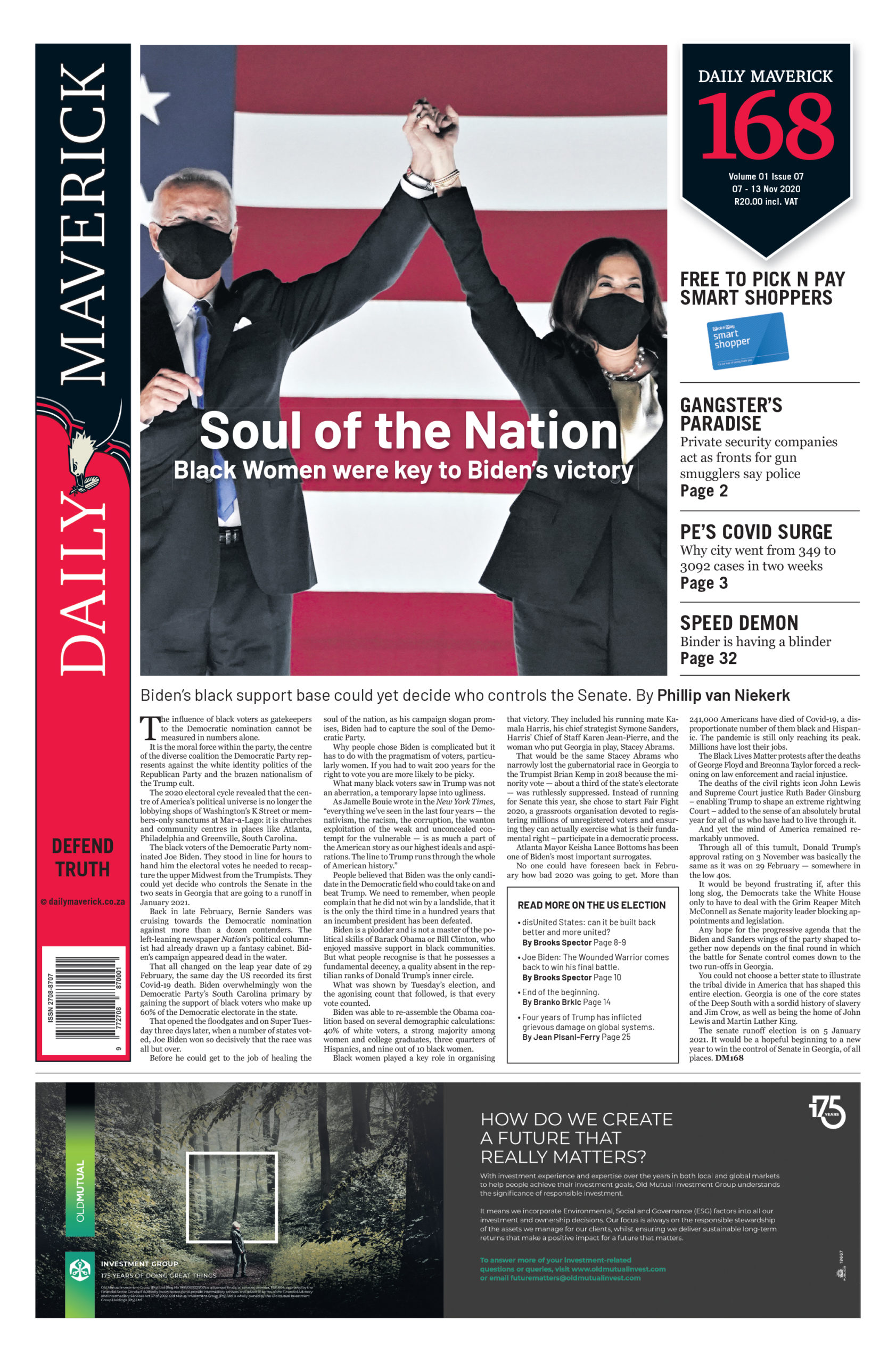US Elections
disUnited States: Can it be built back, better and more united?

National reconciliation and renewed common purpose will be a core project for Joe Biden. The greatness of America lies not in being more enlightened than any other nation, but rather in her ability to repair her faults. – Alexis de Tocqueville
By 1860, the American nation stood on the cusp of disintegration. The Southern states were aware that the political cover for their “peculiar institution” of slave labour was losing out in the face of both a vigorous, growing, industrialising North and the increasing westward movement of freehold settlers. Then, too, the increasing pressure of anti-slavery abolitionists, a sternly disapproving press in the north, and the realisation that the modern nations in Europe had all outlawed slavery in their possessions further contributed to a sense of encirclement and a fear that political action in Washington would outlaw their institution of perpetual human bondage.
Even if a majority of white Southerners did not actually own other human beings, their support for those who did continued to rise. When Abraham Lincoln was elected president in 1860 in a four-way election that saw him receive less than 40% of the total vote, a majority of Southerners were convinced their way of life faced an existential crisis.

U.S. President Donald Trump arrives to speak during his campaign event at Miami-Opa Locka Executive Airport on November 1, 2020 in Opa Locka, Florida. President Trump continues to campaign against Democratic presidential nominee Joe Biden leading up to the November 3rd Election Day. (Photo by Joe Raedle/Getty Images)
And that, seemingly inevitably, led to a declaration of independence by six Southern states, followed soon by five others, including Virginia. With that, the territory of the rebellious states stretched from the Mexican border to the land right across the Potomac River from the nation’s capital.
The ensuing Civil War killed hundreds of thousands and devastated the South’s infrastructure, but it fundamentally changed the region with the elimination of legal slavery.
However, the secular counter-reformation that took hold after Union armies departed established a racial feudalism that kept the South blighted and economically backward for a century — and the after-effects continue to retard the economy in significant swaths of the region, even now.

U.S. President Donald Trump gestures to supporters following a campaign rally on October 28, 2020 in Bullhead City, Arizona. With less than a week until Election Day, Trump and Democratic presidential nominee Joe Biden are campaigning across the country. (Photo by Isaac Brekken/Getty Images)
Over time, however, Southern culture (in the broader meaning of the word) expanded its hold into the rest of the nation. Even though its political allegiances shifted from the old racial oligarchy of the Democratic Party to new Republican political leadership, to a significant degree, the new leadership has embraced a posture that has maintained a dynamic of white domination and a suspicion of the federal government — even if the South is a net consumer of federal spending relative to taxes paid.
More broadly, at least for whites, support for the cultural icons of the slavery-embracing South such as the Confederate battle flag now finds a place on pickup trucks throughout the country, along with the temptations of the gun ownership culture. This is true, even as the South has also given rise to the blues, jazz, rock and gospel music, and as another of its music forms, country and western music, has a fierce hold on fans throughout the entire nation. For many, the South remains a nation within a nation — the same, but apart.
In recent years, the political traditions of the South have come together with the hard, anti-government populism of another share of the population that feels hard done by as manufacturing jobs leave the nation or are replaced by automation, and by the challenges of the increasingly multiracial/multiethnic character of American society. These grievances have coalesced into a share of the nation ripe for exploitation by an opportunistic pseudo-populist, in the shape of Donald Trump, especially as they felt the national media, academics, and other elites looked down their noses at ordinary folk.

President Donald Trump hugs the flag of the United States of America at the annual Conservative Political Action Conference (CPAC) at Gaylord National Resort & Convention Center February 29, 2020 in National Harbor, Maryland. Conservatives gather at the annual event to discuss their agenda. (Photo by Tasos Katopodis/Getty Images)
But by contrast to the moment before the Civil War, the contemporary cultural and political collision is not a purely geographical one — although it does frequently pit the ethos of the nation’s large cities against rural and small-town landscapes. This distribution has helped give it such potency politically. This oppositional stance has spread across the nation and it is connected electronically via social media and online “news” sources, as well as — for some, at least — the malignant conspiracy theories about an enemy that exists all around them.
Monica Hesse wrote in The Washington Post the other day that, even assuming a putative Trump defeat: “Meanwhile, the Supreme Court was reshaped, and conspiracy theories multiplied, and 230,000 Americans died in a pandemic, and children were in cages, and however the race ends up, as of mid-Wednesday morning Trump had amassed 3 million more votes nationwide than he did in 2016: According to exit polls, he performed worse among White men, but slightly better among voters of colour (Biden, at the same time on Wednesday, was ahead in the popular vote by more than 2 million). On Tuesday, a Georgia congressional seat was won by a QAnon believer, and a North Carolina seat was won by a 25-year-old Republican who used the dawning moments of his career as a US representative to tweet out, ‘Cry more, lib.’ ”
Putting the best face on the task of reaching across this divide, (still) Democratic presidential candidate Joe Biden said the day after Election Day from his home in Wilmington, Delaware, as results showed him ahead in the popular vote and climbing towards the magic number of 270 in the electoral vote: “It’ll be time for us to do what we’ve always done as Americans, to put the harsh rhetoric of the campaign behind us, to lower the temperature, to see each other again, to listen to one another, to hear each other again, to respect and care for one another, to unite, to heal, to come together as a nation.
“I know this won’t be easy. I know how deep and hard the opposing views are in our country on so many things. But I also know this, as well. To make progress, we have to stop treating our opponents as enemies. We are not enemies. What brings us together as Americans is so much stronger than anything that can tear us apart.” At least that is Joe Biden’s (and many others’) profound hope.

U.S. President Donald Trump tosses a hat into the crowd as he arrives to speak during a homecoming campaign rally at the BB&T Center on November 26, 2019 in Sunrise, Florida. President Trump continues to campaign for re-election in the 2020 presidential race. (Photo by Joe Raedle/Getty Images)
In contemplating such positioning, one of the nation’s pre-eminent scholars of governance, William Galston of the Brookings Institution think tank, has commented: “These divisions are deep, but in part they reflect political choices made over a long period of time. We have it in our power to begin to turn this vicious cycle — and it is a vicious cycle — into something more virtuous.”
Any such redirection or national reconciliation is certain to be arduous. Given the real differences as well as the tempers, angers, and fears roused by the incumbent president, and aggravated by the way information, rumours, conspiracies are now shared, success is not assured. It is entirely possible that the national soul (to use Joe Biden’s newly favourite word) has become so fissiparous, it is impossible to reintegrate citizens to shared, common purposes.
But in the aftermath of a careful repudiation of Trumpian leadership, and perhaps a realisation that, finally, he has gone too far, no Republican political leader roused themselves to endorse the president’s pre-emptory assertion that he had won the presidency, that state officials must stop counting those troublesome ballots, lest they be guilty of some kind of unnamed fraud, and that he will demand the Supreme Court stop the theft of his victory.
Such a statement made it absolutely clear the president did not accept one of the most basic norms of American political life — that the ultimate arbiters of who decides who is elected are the country’s citizens, not a flailing president using a shotgun splatter of legal challenges.
By contrast, Biden has made it clear that the task of national reconciliation and renewed common purpose will be a core project for his government, assuming he takes office in January. Contained in such a declaration there is an echo of what other now-successful nations, previously crushed by defeat in war, have dedicated themselves to achieving when given a second chance.
Consider how leaders of West Germany and Japan, following their nations’ well-deserved drubbings in World War 2, led rebuilding of their respective nations via new social and economic compacts between leaders, institutions and citizens, and ones with more equitable social benefits and economies embracing the many. These became projects requiring years of commitment from hard-pressed citizens, but the results eventually became models for other nations.
Earlier, this writer had an exchange with a friend, a decidedly left-leaning academic in South Africa, on this topic. He wrote to say that Biden would have the full support of his own party’s left against rightwing Republicans. And, “if he works [with] them and follows through in his promises around green energy, [the] minimum wage, partially better health [care], etc, and does not cave in to conservatives, that will be the basis of healing, in my view. Many working-class white people can come in on that, if their attention can be refocused away from Fox News misrepresentations and QAnon madness.”
The core task, it would seem then, is to find new directions that can move would-be opponents away from their angers and fears, and towards a new version of reconstructing the economic, political and social life of the nation. In Biden’s statements, so far, he appears to fully understand this challenge. But to do this, he will need to mobilise the broad middle of American life in support. Will he be able to achieve De Tocqueville’s challenge, given the current angers, frustrations and antagonisms? DM168





















 Become an Insider
Become an Insider
No comments yet. What’s happened to all those free thinkers who usually post
their support for that most stable genius?
It is unrealistic to expect one man – especially if he does not control the Senate – to turn around a society that is in serious decay. At a fundamental level, the US’s problem is inequality that has been growing since 1970 – read Piketty. Linked to this is the American obsession with individualism and ridiculous fear that any policy that seeks to address social problems is the start of Marxist Communism. This has generated such deep divisions, that the country is no longer able to get to grips with its most serious problems – a decaying infrastructure, reducing its carbon footprint, universal healthcare, public schooling, the high cost of tertiary education, replacing semi-skilled jobs lost to East Asia to name a few. On top of this, their Constitution is out of date and through the Electoral College system and the manner in which the Senate is elected with no recognition of considerable variation in population numbers between States, the chances of the less advantaged in urban areas gaining enough political power to set the country on course to recovering its amazing greatness of the 1940’s and 1950’s are limited. As long as the conservatives have a political stranglehold through the constitutional bias favouring rural areas, it cannot adapt to the requirements of the 21st century.